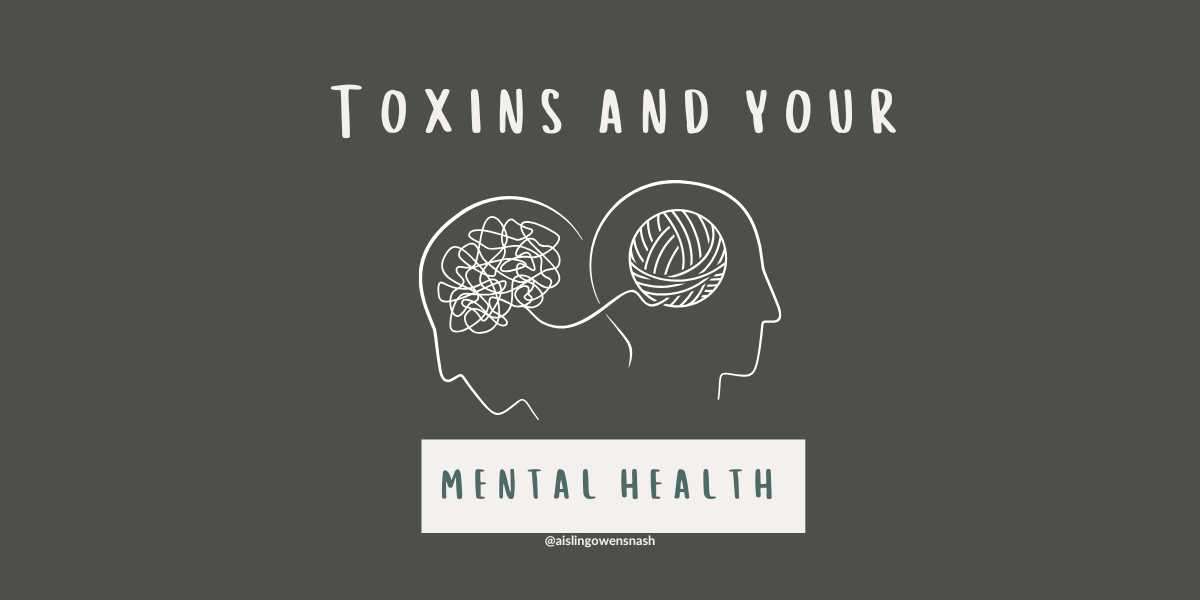The Impact of Toxins on Mental Health: It's a thing!
In recent years, there has been growing awareness about the harmful effects of toxins on our physical health. However, the impact of these substances on mental health is often overlooked. From household cleaning products to personal care items, and even the food we eat, toxins are pervasive in our environment and can have profound effects on our mental well-being. This blog will explore the connection between toxin exposure and mental health, providing strategies to reduce this impact and foster a healthier lifestyle.
Understanding Toxins and Their Sources
Toxins are harmful substances that can come from various sources, including:
- Household Products: Cleaning agents, air fresheners, and other household products often contain volatile organic compounds (VOCs), phthalates, and other harmful chemicals.
- Personal Care Products: Many cosmetics and skincare products contain parabens, synthetic fragrances, and other endocrine-disrupting chemicals.
- Food and Water: Pesticides, preservatives, and contaminants in food and water can introduce toxins into our bodies.
- Environmental Pollution: Air pollution, industrial chemicals, and heavy metals are pervasive in our environment and can accumulate in our bodies over time.
The Connection Between Toxins and Mental Health
Research has increasingly shown that exposure to various environmental toxins can have significant effects on mental health. Here are some key ways in which toxins can impact the brain and mood:
1. Neurotoxicity
Certain chemicals, such as lead, mercury, and pesticides, are known to be neurotoxic. Neurotoxicity refers to damage to the nervous system caused by exposure to these substances. Neurotoxicants can disrupt the function of neurotransmitters, which are essential for brain function and mood regulation. Grandjean, P., Landrigan, P. J. (2006).
2. Endocrine Disruption
Endocrine-disrupting chemicals (EDCs) interfere with hormone function. Hormones play a crucial role in regulating mood, stress responses, and cognitive function. Chemicals such as bisphenol A (BPA) and phthalates, commonly found in plastics and personal care products, can mimic or block hormones, leading to mood disorders and cognitive impairments. Gore, A. C., et al. (2015).
3. Inflammation
Chronic exposure to toxins can trigger inflammation in the body, including the brain. Inflammation is linked to a variety of mental health disorders, including depression and anxiety. For example, exposure to air pollution has been associated with increased levels of inflammatory markers and a higher risk of depression. Block, M. L., Calderón-Garcidueñas, L. (2009).
4. Oxidative Stress
Toxins can induce oxidative stress, a condition where there is an imbalance between free radicals and antioxidants in the body. Oxidative stress can damage brain cells and is implicated in the development of neurodegenerative diseases and mental health disorders. Salim, S. (2014)
Strategies to Reduce Toxin Exposure
Given the significant impact of toxins on mental health, it is crucial to adopt strategies to minimize exposure and promote overall well-being. Here are some practical steps you can take:
1. Choose Non-Toxic Household Products
Opt for cleaning products that are free from VOCs, phthalates, and other harmful chemicals. Look for eco-friendly brands that use natural ingredients. Homemade cleaning solutions using vinegar, baking soda, and essential oils are effective and safe alternatives. Environmental Working Group (EWG).
2. Use Natural Personal Care Products
Switch to personal care products that are free from parabens, synthetic fragrances, and other harmful chemicals. Brands that prioritize natural and organic ingredients are typically safer choices. Always read labels and be aware of common toxic ingredients. Campaign for Safe Cosmetics.
3. Eat Organic and Whole Foods
Choose organic produce to reduce exposure to pesticides. Incorporate a variety of whole foods, such as fruits, vegetables, whole grains, and lean proteins, into your diet. Avoid processed foods that often contain preservatives and artificial additives. Pesticide Action Network UK.
4. Filter Your Water
Invest in a good water filter to remove contaminants such as chlorine, lead, and other harmful substances. Filtered water is not only safer to drink but also better for cooking and cleaning. Environmental Protection Agency (EPA).
5. Improve Indoor Air Quality
Indoor air can be more polluted than outdoor air. Use air purifiers to remove pollutants and ensure good ventilation. Houseplants like spider plants, snake plants, and peace lilies can also help purify the air. NASA Clean Air Study.
Mindfulness and Mental Health
In addition to reducing toxin exposure, practicing mindfulness can significantly improve mental health. Mindfulness techniques, such as meditation, deep breathing, and yoga, can help reduce stress, enhance mood, and improve cognitive function. Goyal, M., et al. (2014).
Conclusion
The impact of toxins on mental health is a critical issue that deserves more attention. By understanding the sources of toxins and their effects on the brain, we can take proactive steps to reduce exposure and improve our mental well-being. Adopting a lower-tox lifestyle, using non-toxic products, eating organic foods, and practicing mindfulness are all effective strategies to protect and enhance mental health.
If you're ready to start your journey towards a lower-tox lifestyle, consider making small, manageable changes that can have a significant impact. Begin by swapping out one or two products, and gradually expand your efforts as you become more comfortable with the process. Remember, every step towards reducing toxins in your life is a step towards better mental and physical health.
Aislíng x
Sources:
- Grandjean, P., Landrigan, P. J. (2006). Developmental neurotoxicity of industrial chemicals. The Lancet, 368(9553), 2167-2178.
- Gore, A. C., et al. (2015). EDC-2: The Endocrine Society's second scientific statement on endocrine-disrupting chemicals. Endocrine Reviews, 36(6), E1-E150.
- Block, M. L., Calderón-Garcidueñas, L. (2009). Air pollution: mechanisms of neuroinflammation and CNS disease. Trends in Neurosciences, 32(9), 506-516.
- Salim, S. (2014). Oxidative stress and psychological disorders. Current Neuropharmacology, 12(2), 140-147.
- Environmental Working Group (EWG). "Guide to Healthy Cleaning."
- Campaign for Safe Cosmetics. "Chemicals of Concern."
- Pesticide Action Network UK. "Why Choose Organic?"
- Environmental Protection Agency (EPA). "Water Filters."
- NASA Clean Air Study. "Interior Landscape Plants for Indoor Air Pollution Abatement."
- Goyal, M., et al. (2014). Meditation programs for psychological stress and well-being: a systematic review and meta-analysis. JAMA Internal Medicine, 174(3), 357-368.








